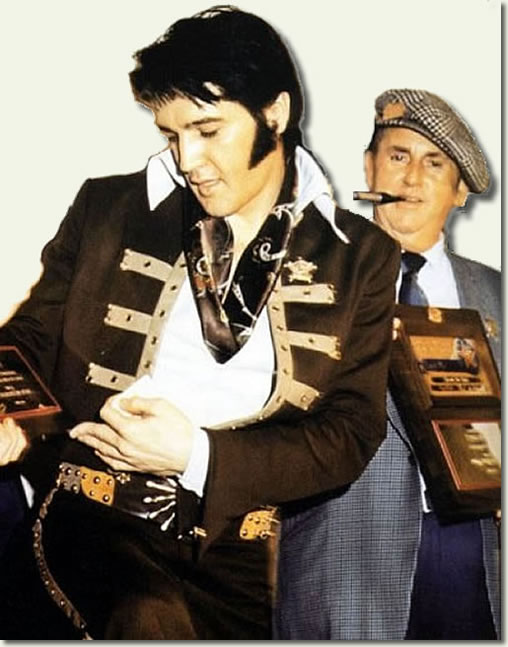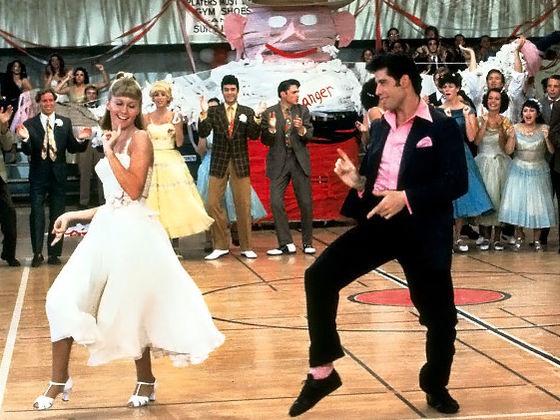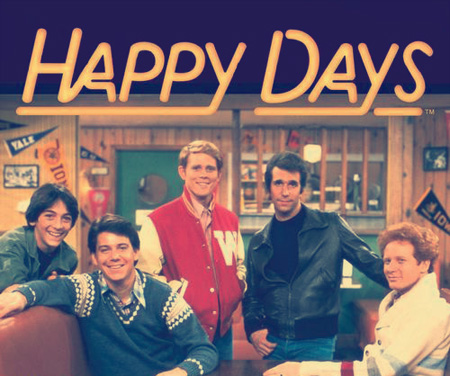The Nifty Fifty’s: An American Myth in the 1970s
During the 70s Americans were stressed. No wonder they yearned for a more relaxed, care-free life. The music and film industries worked together to convey 50s nostalgia as an antidote to alleviate some of this tension, everything was new again. The determined invocation of the 50s in pop music and film definitely suggests that it became a vital signpost for American cultural life. The turmoil of the 60s subsided and Americans just wanted to be happy. The June 16, 1972 issue of Life Magazine displayed a 50s cover with a teenage girl twirling a hula hoop. The “Nifty Fifties” mania spread to college campuses nationwide. Those campus photographs filled the magazine pages and included a 50s quiz. These were cultural signifiers of the 50s using costume, hair, motorcycle jackets, ducktail haircuts, and poodle skirts. [Dwyer 2-4] It is best stated “The idea of the Fifties became a crucial point of reference for America’s self-image.”[Dwyer 5] The King of Rock ‘n roll, Elvis Presley, was at his peak in the 50s under the direction of Colonel Tom Parker, an American talent manager. The 50s nostalgic film, Grease, was released on June 16, 1978. One of the greatest sitcoms of the 50s, Happy Days, debuted on television as a nostalgic teenage situation comedy January 15, 1978 and ran until 1984. Not surprisingly, 50s nostalgia appeared in a most unlikely venue, Woodstock.
Fifties Nostalgia at Woodstock

The sun came up that Monday morning at Woodstock. It was the final day. Jimi Hendrix was waiting for his “curtain call”. It was early, and “the opening act for Jimi Hendrix was Sha Na Na, a Columbia University a-cappella group turned 50s Revival act”. They showed up with stylized leather jackets, greaser hairdos, and costumes acquired from a travelling theatre production. [Dwyer 48] Sha Na Na got their name using a lot of “nonsense syllables” from a doo-wop hit by the Silhouettes, “Get a Job”. They staged a song and dance repertoire with classic 50s rock n roll, “simultaneously reviving and sending up the music and 1980s New York street culture”. [Damon]
They did a lot of covers that morning: “Jailhouse Rock by Elvis”, “Yakety Yak” by the Coasters, and “At the Hop” by Danny and the Juniors. Sha Na Na presented an instantaneous “re-emergence of the style, symbols and sound of the 50s’ that existed in a retro culture.” It was a critique of a different sort of 50s. It was greatly unexpected. That day “ audiences reclaimed the 50s that existed in their own memories” which made it all the more fun for Sha Na Na. For fans, the group instilled nostalgic pleasures, the way things were. [Dwyer 48, 49, 50]
The Rise and Fall of Elvis Presley
Elvis Presley is considered to be one of the most important entertainers in twentieth century American Pop Culture.[Elvis Bio] Elvis was hardworking, a patriot (served in the US Army 1958-1960), and individualistic to the point that he was a star. He was polite and mannerly. Self-determination was his motivation to get on the radar screen, and his family’s move to Memphis was the start. Self-awareness and self-confidence pushed him into the limelight. Elvis, who was seen in the 1950s as controversial became sanitized in the 60s and 70s as he became a nostalgic symbol of a “more innocent time.”

The history of Elvis’ early jobs is a bit vague, but we do know he stopped by Sun Studios to record a song for his mom in the summer of 1953. He was 18. Sam Phillips wasn’t there that day. Sam’s secretary, Marion, recorded Elvis. He was working a lot of odd jobs at this time, truck driver, metal worker, and movie usher. He stopped by Sun Studios often, and he got to know Marion and Sam, hung out with the musicians, ran some errands, and yes, even swept the floor!
In January 1954 he saved up enough money to make another recording. This time Sam recorded him. Nothing really came of that session, except that Sam introduced Elvis to Scotty Moore, who would become Elvis’ guitar player. In July of 1954, almost a year since he made that first record for his mom, he asks Sam to record him once more. Elvis recorded “That’s Alright Mama “ and rock n- roll history was made.[Pachence] Elvis’s success began to increase, and so did his dynamic performances. Professionals in the music business noticed, and so did Col. Tom Parker. He became Elvis’s promoter and manager. In 1955 Sam Phillips was in need of money, and he sold Elvis’s contract to RCA for $35,000 and Elvis got $5,000. Sam used this money to produce new artists such as Jerry Lee Lewis, Carl Perkins, and Johnny Cash. [Covach, Flory] . Rock n Roll demanded a King, and Elvis was crowned the “King of Rock n Roll” The young Elvis was handsome, sexy and dangerous. All rock comes from the hips, and Elvis scandalized parents with his rockin’ hips, and became very popular with an wide array of teenagers.[Covach, Flory] On September 9, 1956 Elvis made his first appearance on the Ed Sullivan Show. After pressure from teenagers the smug Sullivan wound up paying $50,000 for Elvis, after refusing $5,000 early on. The cameraman only shot him from the waist up. [Gibson]
Come the 60s and 70s, however, Elvis’ manager, Tom Parker sanitized Elvis’ persona. Tom Parker had the connections, but he made Elvis “campy” at the expense of Elvis’s career. You could say that Parker had the American value of capitalism. Presley became the Vegas Elvis in the 60s and 70s. Elvis did a “comeback special” in black leather in ’68[Pachence]. While there is no definite evidence that the Colonel contributed to the eventual death of Elvis, comments from friends of Elvis, and others aroused suspicion… Col. Parker had a dark and questionable past. Because he served in the US Army his previous life was never questioned. Years later inquiries in Europe led to an unsolved murder in which he was a suspect. This was the reason he never did a world tour with Elvis. [Dash] He stifled Elvis’s career, and put extreme pressure on him. His performance schedule was grueling. When Elvis became depressed after his father died, Parker became a father figure to him. Elvis started taking legal, prescribed drugs. He became more anxious, and couldn’t sleep, and the drugs increased. It seems that Elvis’s actual death was an accidental overdose. [Pachence] Thus, even people like Elvis who, in many ways, represent America in the 1950s became mythologized versions of their previous selves. In his case, while he was still living.
Grease is the Word

A nostalgic film like Grease deserves to be an American myth because it’s a reminder of who we want to be where “the rules are there ain’t no rules”.[Bailey] This was just what America needed after the excess of shows with political activism. “Love is a Many Splendored Thing”, opens this movie musical with” marvelously, soaringly, inane” sound. Olivia Newton-John as Sandy and John Travolta as Danny have a summer romance. They didn’t expect to see each other again, but Sandy was transferred to Rydell High School which is Danny’s universe. Sandy tries to break into the clique, but it wasn’t working [Broadway]. Danny was the coolest greaser in town, and he was avoiding Sandy to look tough as leader of his gang, the T Birds. [Canby] Sandy was determined to get her guy. At the end, the Pink Ladies helped Sandy figure out how to sweep back the leader of the Burger Palace Boys. [Stage Agent]
Grease pulsates with the rhythms of the 50s. The music fits the characters. The director, Randall Keizer, shows the visual rhythms that he builds up to accompany the songs and they to rise out of the music and take over”. Danny is love struck as Sandy explodes onto the scene in tight, black leather pants, and top. He follows her around with both of them dancing, and singing “You’re the One That I Want.” [Knight] While this movie was in the theatres, it was the “ultimate social distinction” to see it multiple times. It created sort of a “happy love-in”. All the ingredients a teenager could want: “tears, laughter, and sex.” Grease really made their temperature rise. Hormones were flying in the movie theatres. There were Grease parties, and dance classes. Girls had their own routines to “You’re the One That I want”. Grease emphasized the American value of belonging. [Bailey]
Happy Days
‘These Happy Days are Yours and Mine!’ The jukebox is a symbol of the 50s and is linked to this era in the television series Happy Days. [Dwyer.70] While it was a sitcom in the 70s, it was all about 50s nostalgia. TV sets were tuned in every Tuesday night at 8:00pm to enjoy American pop culture. The show centers on the all American Cunningham family. Hardware store owner Howard and his wife Marion had two children, Richie who was “squeaky-clean” and his “sweet and sour” sister, Joanie. They had a boarder, a greaser turned social good guy, Fonzie, better known as the “Fonz”. Richie always gets into trouble. Fonzie is always there for advice on women and backing him up with muscle. He also tutored Richie’s friends Potsie and Ralph in worldly ways. He epitomized the guy they wanted to be… Later episodes include Fonz’s “Mini-Me” cousin who wound up as Joanie’s boyfriend. [TV Tropes]
American youth culture of the 50s was teenagers hanging around a juke box playing rock n roll. The Cunningham family had the American value of eating dinner together every night. Fonzie always appeared in leather jackets, and with his motorcycle. His American Individualism got him into fistfights, and sexual encounters with the women. Social science of the 70s called his behavior delinquent, even though he didn’t exhibit the hard edge of James Dean or Marlon Brando. The Fonz’s finger snapping was his trademark to always get what he wanted. On the contrary, Richie showed a good guy image with a desire for a one woman relationship, which usually got him into trouble. Fonzie as the “cool ladies man” was what Richie never was. [Lewis] Happy Days was born by two snowbound TV executives in Newark, NJ Airport in 1971. Michael Eisner of ABC, and Tom Miller of Paramount were looking for nostalgia, innocence and morality by coming up with a family oriented sitcom. During this turbulent time it became a refuge for some Americans. It was some time before viewers realized we could be this American family [Cellania]
Nostalgia Forward
 The nostalgia of the 50s as presented by Sha Na Na at Woodstock was in 1969. Most of the crowd had experienced this era. While they were intent on social change, it was a long awaited, and at this juncture they needed fondness in their lives. Beginning in 1954 the turbulent Civil Rights Movement, and the Vietnam War were equalized by the dominance of Elvis Presley and the birth of Rock n Roll. Mass media flooded the market with records that appealed to the youth culture. When teens clamored for more. Grease answered their call. The cast sang and danced their way into the sexual revolution of the 50s. Happy
The nostalgia of the 50s as presented by Sha Na Na at Woodstock was in 1969. Most of the crowd had experienced this era. While they were intent on social change, it was a long awaited, and at this juncture they needed fondness in their lives. Beginning in 1954 the turbulent Civil Rights Movement, and the Vietnam War were equalized by the dominance of Elvis Presley and the birth of Rock n Roll. Mass media flooded the market with records that appealed to the youth culture. When teens clamored for more. Grease answered their call. The cast sang and danced their way into the sexual revolution of the 50s. Happy
Days on the other hand presented the myth of the American family in the 50s. This sitcom was a counter-myth to reality. Pop culture of the 50s was the people’s culture, an authentic representation of their time and place. Unlike a mass society, people enjoyed meaningful relationships. It’s who we were, and when that feeling of nostalgia overcomes us, it’s who we want to be again.
Works Cited
Cellania, Miss, Ivy Picklebottom, and Joseph Francis. “Happy Days.” Neatorama. N.p., n.d. Web. 22 Nov. 2016.
Damon, Bill. “Who Performed Before Jimi Hendrix at Woodstock? The 50’s Nostalgia Group
Sha Na Na!” BillDamon.com. N.p., 13 Nov. 2012. Web. 23 Nov. 2016.
Dash, Mike. “Colonel Parker Managed Elvis’ Career But Was He a Killer on the Lamb? Career, but Was He a Killer on the Lam?” Smithsonian Magazine.com. Smithsonian, 24 Feb. 2012. Web. 22 Nov. 2016.
Dwyer, Michael D. Introduction. Back to the Fifties. UK: Oxford UP, 2015. 2-4. Print.
Gibson, Christine. “Elvis on the Ed Sullivan Show: The Real Story.” Elvis Presley Photos.com. N.p., n.d. Web. 21 Nov. 2016.
“Happy Days (Series) – TV Tropes.” TV Tropes. N.p., n.d. Web. 23 Nov. 2016.
Lewis, Lisa Ann. “- Happy Days.” The Museum of Broadcast Communications – Encyclopedia of Television – Happy Days. N.p., n.d. Web. 22 Nov. 2016.
Pachence, John E. “Nostaglia of the 50s.” Personal interview. 14 Nov. 2016.
John Pachence, Lecturer in Music Integrative Arts, Program Coordinator Performing Arts Penn State Abington History of Rock
Rigsbee, Valerie. “Grease.” Broadway Musical Home – Grease. N.p., n.d. Web. 22 Nov. 2016.
Shire, Avital. “Grease Synopsis.” Stage Agent. N.p., n.d. Web. 22 Nov. 2016.
“Unknown.” Elvis Presley Biography. 2016 Elvis Presley Enterprises, n.d. Web. 21 Nov. 2016.
What do you think? Leave a comment.











Best memory of my life
Grease was basically “High School Musical” for the 70s, with the added “bonus” of being one of the first big Baby Boomer nostalgia trips. Even worse, now the movie itself is a nostalgia trip for the children of Baby Boomers. As both a film and a cultural touchstone, it remains a steaming pile of shit.
Which is too bad, really. There are a number of songs, dance scenes and even individual moments that are genuinely enjoyable. And I can’t in good conscience fault the film for betraying its darker roots when I haven’t seen the original version in the first place.
But that doesn’t stop the movie as a whole from being relentlessly cheesy (cue “it’s supposed to be!” arguments), badly acted (small price to pay for getting good singer/dancers, I guess) and just… just STUPID in so many way. Worst of all, the final denouement – that everyone can be happy if they’re just willing to completely alter their distinctive personalities to better conform with society/peer pressure – makes me want to poo radioactive vomit.
I thought Happy Days was so cool when I was like ten or eleven. But by junior high, when they started rerunning the hell out of it on cable, I began to recognize how truly awful it was. Then again, the same thing happened with a lot of shows from the late 70s and early 80s that I watched as a kid. For some reason, TV shows have a reverse nostalgia effect on me – the shows I loved as a kind now bore the crap out of me. I wonder if maybe I just outgrew the ability to not think too much about dumb TV.
Could it be as a little kid you only had OTA tv? With only three channels there wasn’t much of a choice of reruns you had. The shows I saw at this time haven’t held up well. But when my family got cable in ’87 (age 12), i fell in love with shows as different as “Jack Benny” and “Maude”. Those shows have held up.
this was a very solid write-up!
I always found it strange, even when I watched Happy Days show religiously, how it eventually dropped any pretense of taking place in the 1950s. I mean, they referenced things that happened in that time period, but after a while only Fonzie still wore “greaser” hair, all the rest of the male actors started wearing feathered, below the collar hair and relatively modern clothes. I’m pretty sure “Joanie Loves Chachi” didn’t even make the slightest attempt to look as though it took place in the early 60s, and without explanation.
Also, it was kind of funny how Henry Winkler (and after a while Scott Baio) would walk into a room and have to stand there for a few seconds and wait until the audience stopped hooting and hollering before saying his next line.
Nostalgia.
Grease was sleepover fodder for me when I was a kid—I think it’s a rite of passage for many young girls to watch the movie over the years and be shocked and amused by the jokes and lines that go over your head. If you recited the lyrics of “Greased Lightning” to a kid on a playground you’d get arrested.
John Travolta was such a thing of beauty in that movie.
It’s hard to believe that Happy Days ran from 1975 – 1984. It seems like it crossed over from one sitcom era to another. Combined with its 50s/60s setting, it’s really an odd program that seems to be not of any specific time, but of several specific times.
It’s amazing to think it briefly overlapped with Cheers, The Cosby Show and Night Court. It was so easy in the pre-cable/internet era to keep something going for a million years even if no one was really that into it. Another case-in-point: Step By Step.
Happy Days is one of those shows that was always on TV in repeats when I was a kid, but remember nothing about except for the theme song.
I remember Fonzie winning the dance contest, the Mork episode, Pinky Tuscadero, more Fonzie, and some generic scenes of Potsie and Ralph.
I hate Grease movie because my sister went through a John Travolta/Olivia Newton John phase and watched this “Two of a Kind” “Saturday Night Fever ” “Staying Alive” “Xanadu” alot.
Much, much love for Xanadu. First film I ever saw on laserdisc.
“Tell me more, tell me more. Did she put up a fight?”
These lyrics are a tacit approval of rape. Shameful Travolta, shameful.
Grease! First film I saw in a movie theater!
As a 6 year-old kid, I was totally blown away by the theme song during the opening credits. I still really enjot. Ahhhh…pointless nostalgia.
I started out really liking “Happy Days”, it was a good, funny show. But, boy, did it turn into Hollywood TV Crap! Whooooooo!
There’s an old Mad article, from about 1985-6, that charted the rise and fall of the typical sitcom in eleven or twelve seasons. The fictitious show, set in a bowling alley in the 50s was obviously standing in for Happy Days. It was a detailed dissection and takedown of everything wrong with Mr. Marshall’s pandering, populist-at-the-cost-of-all-else approach and funny to boot. One season included an adopted foreigner and a monkey!
I hate grease, for one very specific scene. At the end, they drive off, and the car flies. It is a flying car.
Is it fair to say that nostalgia has become an American epidemic or perhaps social media has something to do with it? I am only saying this an undergraduate in English , but I find that much of the older population has become fixated with the past. Its almost as though we as Americans have a need to forget our history and recklessly plow our beliefs due to nostalgia. For instance Splash Mountain, a ride at Disneyland that is associated with Song of the South which isn’t even out on DVD yet…
What blows my mind about Grease…
It’s a bunch of people associated with disco singing 50’s rock and doo-wop songs. But the title track is a disco-style song sung by Frankie Valli!!
Good job, juxtaposition.
Interesting the story shows the dichotomy between that ‘50s revival in the ‘70s – the era we think of as free love and bellbottoms.
Nice article. It lends itself to a follow-up based around the ’90s nostalgia currently experienced by millennials and their slightly older contemporaries.
Growing up in the 1950s, not as a teenager, however, but younger I just don’t remember it the way I see it in anything that focuses on that decade. I remember Eisenhower as President (and later meeting him on a golf course) that stands out to me. I remember an emerging civil rights movement and seeing signs of it as well as signs that segregation was alive and well in the South. I remember transistor tubes in a TV and the need to take them to the drug store to be tested. I remember a TV station going off the air before midnight and being excited when the Late Show became the Late, Late Show so old movies were on after midnight. I was stuck on the New York State Thruway along with many others because we were heading to Woodstock and the state police shut it down, so I guess that makes me part of the Woodstock era. So did I look back from Woodstock at the 1950s and see it anywhere near the way it was seen in Happy Days or Grease? No. There’s darkness and light and I remember seeing both. There are segments, images but not some overarching way of fondly remember that decade. What clearly stands out was the New York Giants announcing they were leaving for California. So the Brooklyn Dodgers were leaving too–let them go. But the Giants!
I can’t help but wonder whether, in a few decades, the 2000s or 2010s will be romanticised like this. Which aspects will people supposedly yearn for?
Really interesting article, too 🙂
I just re-read your essay again since I’m planning to do writing on New York Giants baseball in the 1950s, so I’m reading a great about that era to put certain years from that decade into a broader perspective. Again, a good essay.